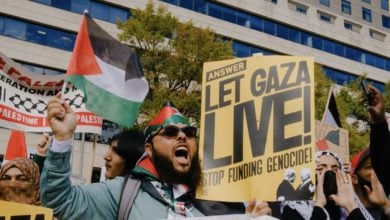Nearly 150 people attended an Aug. 31 Southern California memorial for Palestinian national poet, Mahmoud Darwish. Darwish, 67, died on Aug. 9 after open-heart surgery in Houston, Texas. The memorial was organized by over a dozen Arab American and progressive organizations, including the ANSWER Coalition (Act Now to Stop War and End Racism). Darwish was revered the world over for his masterful verse and prose.
 Palestinian poet Mahmoud Darwish |
Darwish then remained inside the 1948 borders of historic Palestine, often being imprisoned in Israeli jails for his incendiary poetry and writings in the communist press.
His early poetry seethed with the just outrage of the oppressed striking out at a colonial oppressor. This is best illustrated by his resistance poem, Identity Card, written in 1964, a part of which is reproduced here:
Record!
I am an Arab
You have stolen the orchards of my ancestors
And the land which I cultivated
Along with my children
And you left nothing for us
Except for these rocks …
So will the State take them
As it has been said?!
Therefore!
Record on the top of the first page:
I do not hate people
Nor do I encroach
But if I become hungry
The usurper’s flesh will be my food
Beware …
Beware …
Of my hunger
And my anger!
Darwish studied at Moscow University in the Soviet Union in 1971 and later moved to Beirut to join the Palestinian Liberation Organization, remaining there throughout the Lebanese Civil War and the Israeli invasion in 1982. He continued to write poetry, always experimenting with the Arabic language, and always continuing to pose the question of Palestine as his central concern.
In Beirut, Darwish documented the 1976 siege and massacre at Tal Al-Zaatar in his poem, Ahmed Al-Zaatar (1977). He later wrote an exceptional book of prose, Memory of Forgetfulness, a haunting take on the daily horrors of the 1982 Israeli war on Lebanon and the siege of Beirut.
He continued the political struggle in later years, while gaining international accolades and literary credibility. Darwish was elected to the executive committee of the PLO, but resigned in 1993 over his objections to the bankrupt Oslo Accords, spearheaded by Yasser Arafat’s Fatah party. Darwish moved to Ramallah, in the West Bank, in 1995.
One year before he died, the apartheid Israeli state permitted Darwish to return to the Galilee for the first time since 1971 for a lecture in the port city of Haifa. After Darwish’s death, Israel refused to allow him to be buried near his childhood home. The Palestinian Authority mandated an official three-day mourning period. A massive funeral attended by tens of thousands of Palestinians was held in Ramallah just days after Darwish’s untimely death.
A voice of resistance to occupation
At the Southern California memorial, Arab American community groups spoke in honor of Darwish and his contributions to the Palestinian cause. Speakers included Yousef Abudayyeh of the Free Palestine Alliance, Lily Karam of the Palestine Children’s Relief Fund and a relative of Mahmoud Darwish living in the Los Angeles area. Poet Hassan Hassouni recited a poem just written to remember Darwish.
Representatives of the Syrian, Jordanian, Lebanese and Iranian communities all added their voices to the event. Nasser Faris, a member of the Party for Socialism and Liberation, spoke eloquently as a member of the Egyptian community.
The memorial’s emcees were Muna Coobtee of the Palestinian American Women’s Association and the PSL, and Bassam Mahdawi, publisher of Al-Wataan newspaper. Coobtee’s father was Darwish’s classmate in the Arab village of Kafr Yasif for years.
Preston Wood, the Southern California coordinator of the ANSWER Coalition delivered a heartfelt, yet political, statement to commemorate Darwish. He said:
“The ANSWER Coalition is deeply saddened by the loss of this irreplaceable Palestinian poet and writer, who was much more than a towering cultural figure for the Arab people. More importantly, Mahmoud Darwish was always a strong and true voice for the cause of Palestinian national liberation from Zionism and imperialism.”
Wood continued, “We are proud to honor Darwish as our goals were the same—self determination for the Palestinian people, and the defeat of colonialism and imperialism in the Middle East. Although his poetry is not yet required reading in the United States—as it should be—Darwish’s work has sparked consciousness about the Palestinian struggle and national identity with people all over the world, including millions of Arab Americans and people of all backgrounds in the United States. …
“Inspired by the words and work of Mahmoud Darwish, and all of our fallen Palestinian comrades, we know that freedom, justice, total liberation and return will come soon. The enduring strength of the Palestinian people has made this not only possible, but certain.”






